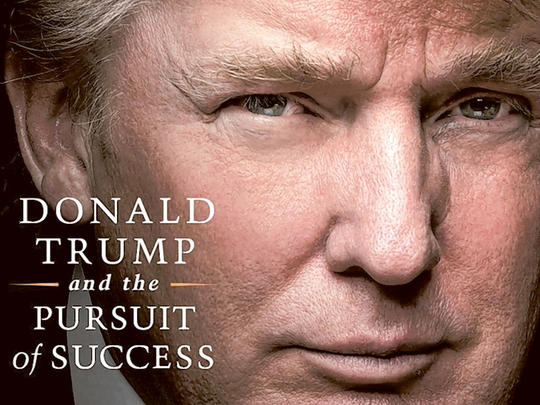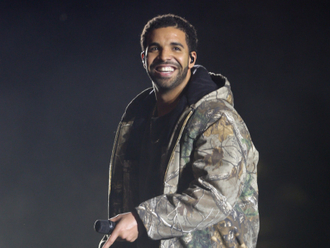
Never Enough: Donald Trump and the Pursuit of Success
By Michael D’Antonio, Thomas Dunne Books, 400 pages, $27
As pure entertainment, the race for the Republican presidential nomination has been a resounding success. Donald Trump, the star, has been by turns witty, provocative, outrageous — and always telegenic. He helped draw an estimated 24 million viewers to the first televised Republican debate, a record, and a ratings bonanza for Fox News, with which he nonetheless publicly feuded.
Blithely flouting all conventions of presidential debate and decorum, Trump indulged in the name-calling, personal attacks and one-liners that have vaulted him to the top of the polls.
Much of the media is treating the contest as just another reality show, in which any day we’re going to tune in to watch Trump get voted off. But in the aptly titled and perfectly timed “Never Enough: Donald Trump and the Pursuit of Success”, Michael D’Antonio, a former “Newsday” reporter and author of over a dozen books, places Trump’s life and career in a context that helps explain why his emergence at the top of Republican presidential polls was not only plausible but inevitable.
In the self-absorption and self-promotion he has practiced all his life, “Donald Trump is not a man apart,” D’Antonio contends. “He is, instead, merely one of us writ large.”
“Never Enough” is an admirably straightforward, even-handed but nonetheless damning account of Trump’s life, including his failed marriages and businesses and his emergence as a reality television star and presidential contender. Trump provided some access before cutting off D’Antonio and his research assistant after they dared to interview someone on his long list of enemies.
This access nonetheless enables D’Antonio to showcase Trump’s tendency to turn any question into a discussion of himself. Asked to name a book that influenced him, he replies: “I would love to read. I’ve had many bestsellers, as you know, and ‘The Art of the Deal’ was one of the biggest-selling books of all time — that’s really what started this whole thing.” Soon he’s on to “The Apprentice” — “the No 1 show on television” — but not a book at all.
Out of necessity, D’Antonio relies heavily on published sources, which are voluminous, considering that Trump’s every move has been chronicled by the media and that he’s already the subject of a substantial bibliography, not to mention his 10 autobiographical and self-help books, from 1987’s “The Art of the Deal” to this year’s e-book “Trump for President: Why We Need a Leader, Not a Politician”.
As D’Antonio notes, Trump “has been a topic of conversation in America for almost 40 years. No one in the world of business — not Bill Gates, Steve Jobs or Warren Buffett — has been as famous as Trump for as long.”
I didn’t find any major revelations in “Never Enough”, but D’Antonio’s book usefully plants Trump’s rise, fall and comeback in the context of broader social, psychological and technological trends — the rise of the Me Generation, the “culture of narcissism” described by Christopher Lasch, the internet and social media — and brings the story forward to Trump’s announcement this year that he would seek the Republican nomination.
D’Antonio points out the obvious, which is that much of what Trump says can euphemistically be called exaggeration, but he sheds little light on the source and scope of Trump’s fortune, which is his primary qualification for the presidency. Most of Trump’s claims — to being a great deal-maker, a great athlete, a great businessman — are hard to verify, though there seems little more than a kernel of truth to at least some of them.
This year, “Forbes” pegs Trump’s wealth at $4.1 billion (Dh15.1 billion), which, while less than half the $9-billion Trump claims, indeed makes him rich. Much of that wealth comes from the Trump brand rather than deal-making per se. His star turn on NBC’s “The Celebrity Apprentice”, his licensing fees, his books, his speaking engagements, even his men’s wear line, have brought in millions. He’s had good divorce lawyers.
But he’s hardly another Henry R. Kravis or Carl C. Icahn. Four of his heavily indebted casino companies filed for bankruptcy, stiffing his creditors. Citibank took possession of the ill-fated Trump Shuttle airline. Trump himself narrowly escaped personal bankruptcy.
As David Segal wrote in “The Washington Post”: “The people who know the least about business admire him the most, and those who know the most about business admire him the least.”
One thing, however, is undeniable: Trump is a master of self-promotion, unrivalled even by the likes of the Kardashians. Whatever the outcome of the present presidential campaign, it has made him as famous, as instantly recognisable and as talked about as anyone in America.
Trump figured out early on that fortune follows fame, which is all but indistinguishable from notoriety. Whether or not Trump ends up in the White House, his golden years surely lie ahead of him. His agents must be salivating at the prospect of his next Hollywood contract.
Trump first appeared on the front page of “The New York Times” in 1973, with the headline “Major Landlord Accused of Anti-Black Bias in City”, hardly an auspicious beginning, after the Justice Department charged the Trump Management Corporation with violating the Fair Housing Act. (Trump hired Roy Cohn, himself a master of press coverage who became a close friend and mentor to Trump, to launch a counterattack.) The case was eventually settled, with a consent decree but without Trump or anyone having to admit guilt.
Three years later that was a distant memory when he was profiled by a “Times” reporter, Judy Klemesrud (“tall, lean and blond”, she wrote), riding around in a chauffeured Cadillac limousine with “DJT” vanity plates and offering the dubious claims that he was worth “more than $200 million”, graduated first in his class at Wharton and was publicity-shy.
Trump has never since been out of the media spotlight. Publicity came “naturally” to him, D’Antonio suggests, which doesn’t give Trump enough credit. As Trump told Timothy O’Brien, author of the 2005 book “Trump Nation”, he had “devoted countless hours to keeping his name in the press. Having supplied many journalists with juicy stories, even some that reflected poorly on him, Trump had banked favours that he could redeem.”
Trump also seems to have an uncanny sense of the elements of a good story — conflict, money and sex — especially when he’s the subject. Even though he made some half-hearted protests (further prolonging public attention), he surely basked in the comment of his second wife, Marla Maples, that sex with him was the best she’d ever had.
“I have always gotten much more publicity than anyone else,” Trump boasts, which, as his exaggerations go, is probably one of the more accurate. This ability seems rooted in a seemingly inexhaustible need for attention. D’Antonio reports that “Trump begins each day with a sheaf of papers detailing where and how often his name has been mentioned in the global press ... This need to be noticed, and his drive to satisfy it, has made him a singular figure worthy of close inspection.”
It also makes him pretty much a classic case of narcissism, and D’Antonio cites several textbooks in which Trump serves as an example, including “Abnormal Behavior in the 21st Century” and “Personality Disorder and Older Adults”.
Narcissists typically enjoy conflict and will readily lie or exaggerate to gain the upper hand. Trump’s life can pretty much be summed up as an unending stream of conflicts, some real, many manufactured, all good copy. Trump tells D’Antonio: “I always loved to fight, all types of fights, including physical.” His crude attack on Megyn Kelly, the Fox News anchor and debate moderator, is just the latest of countless examples.
No amount of armchair psychoanalysis can fully explain Trump’s outsize personality, but D’Antonio’s account of his formative years suggests the source of at least some of these traits. His father, Fred, was demanding, withholding and a workaholic. “The father was really tough on the kid,” according to Theodore Dobias, a coach and something of a father figure to Trump. “He was very German.”
Trump was a rebellious 13-year-old when his parents sent him to the New York Military Academy in 1959. “Trump was always proud of himself,” Dobias recalls. “He believed he was the best.” He added that Trump “was a conniver even then. A real pain in the [expletive]. He would do anything to win.”
No one should be surprised that this ambition has propelled Trump into the ultimate contest, which is the race for the White House, or that he’s in it to win. He has tapped into an angry segment of the population that admires the Trump brand, which stands for success, a willingness to fight and a contempt for elites in the media and the political establishment. As D’Antonio puts it, “Obscured by hype, the facts of his life didn’t matter as much as the idea of him.”
In the age of social media, where everyone is the star of his own Facebook page, “we no longer agree that intense self-regard is a sign that something is wrong”, D’Antonio concludes. On the contrary, it’s a virtue.
Whether that holds true for a majority, or even a significant minority, of the electorate remains to be seen. Based on “Never Enough”, it’s hard to imagine anyone who has less in common with George Washington, Abraham Lincoln and Franklin Roosevelt, considered by many scholars our three greatest presidents, than Donald Trump. Among their other virtues, they are revered for their honesty (Washington), modesty (Lincoln) and compassion for the poor (Roosevelt).
–New York Times News Service
James B. Stewart, who writes the Common Sense column for “The Times”, is the author of nine books, including “Den of Thieves” and “Tangled Webs”.








